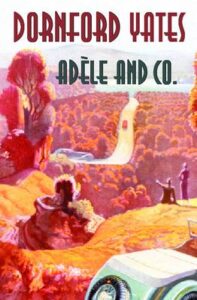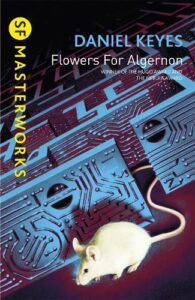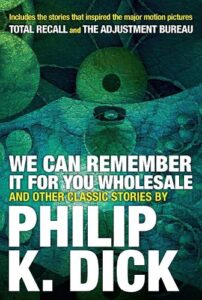Decades: Compiling the Ultimate Library with Guy Morpuss
Try to imagine being tasked with the responsibility of filing the shelves of a brand new library. You can add any books to the shelves but you want to ensure only the very best titles are available to readers. That was the challenge I set myself back in January 2021. It didn’t take long for me to realise I could not possibly fill a library without enlisting some help – the Decades Library was born.
Each week I am joined by a guest curator who is asked to nominate five books which I add to the Library shelves. My guests are authors, publishers, bloggers and journalists – all booklovers. There are just two rules governing the selections:
1 – You Can Select ANY Five Books
2 – You May Only Select One Book Per Decade From Five Consecutive Decades
Rule two is why my library is called the Decades Library – apparently restricing choices to one book per decade over (any) fifty year publication span causes some head scratching. The end results are always fascinating.
This week I am delighted to welcome Guy Morpuss to the Decades Library. I loved Guy’s debut novel (Five Minds) which was published in 2021. Five Minds blew my mind with the fabulous concept of multiple people sharing a body, each of the people get their own window of awareness over the course of a day. It’s one of the most memorable books I have featured in 8 years of blogging.
Time to pass the curators hat to Guy and let him introduce his selections….
 Guy writes speculative crime fiction: twisting one aspect of the real world, adding a dead body, and playing with the consequences.
Guy writes speculative crime fiction: twisting one aspect of the real world, adding a dead body, and playing with the consequences.
His first novel, Five Minds (2021), is about five people sharing one body, one of whom is trying to murder the others. It was a Financial Times Book of the Year and a Kindle Number 1 Bestseller in Technothrillers and Post-Apocalyptic SF. Translation rights have been sold in seven territories.
His recently-published second novel, Black Lake Manor (2022), is a locked room murder mystery set on Vancouver Island, where the killer can unwind time – which makes it difficult for the detective trying (repeatedly) to solve the murder. It was a Financial Times Book of the Month.
Before taking up full-time writing Guy practised as a barrister/QC in London.
DECADES
In adding to the Decades Library I have chosen books that inspired me to read – and ultimately, therefore, to write. I started out with my father’s library of fast-paced detective stories and thrillers; and then I branched out into science-fiction.
Sadly, though, I have no space for some fantastic authors that I grew up reading: Alistair MacLean, Captain W.E. Johns, Desmond Bagley, Mary Shelley, Arthur Conan Doyle, Baroness Orczy, Arthur C Clarke, Isaac Asimov, Iain M Banks.
Although, curiously no Agatha Christie, which didn’t feature on my father’s bookshelves. It was only after Viper Books offered me a publishing deal that I confessed to my editor that I had never read any of her books – an omission which I have since corrected.
I have chosen the 1920s to the 1960s, as the end of the classic crime era and the rise of science-fiction neatly mark my journey as a reader.
The Door With Seven Locks (1926) – Edgar Wallace
Although probably best known now as a co-author of King Kong, Edgar Wallace was one of the most prolific crime writers of the early twentieth century. His output was prodigious, with many of his novels being written over two or three days. It is said that a friend phoned him once to be told that he was in the middle of writing a book, and responded: ‘I’ll hang on till he’s finished it.’
I was tempted to add Room 13 – the first outing of his brilliant detective JG Reeder – but in the end opted for The Door With Seven Locks, written in a year when he published more than one book per month.
The intriguing title also sums up the premise of the book: a Scotland Yard detective is told by a small-time criminal of his failed attempts to open the door in a tomb which has seven locks. The lock-picker is murdered, and the detective gets caught up in a search for the seven keys. This is typical Edgar Wallace: fast-paced, easy to read, a crime thriller with a dash of romance thrown in.
Adele & Co (1931) – Dornford Yates
One of the first books I ever read on my own was Blind Corner by Dornford Yates: a chase across Europe in the hunt for treasure hidden in a secret chamber at the bottom of a castle well.
However, I have opted to include Adele & Co, which neatly combines the two sides of Yates’s writing: on the one hand the ‘Chandos’ books (such as Blind Corner) – fast-paced thrillers often compared to the works of John Buchan; on the other the ‘Berry’ books – humorous laments to the declining fortunes of the English upper-classes after the First World War. I remember reading Berry & Co in class once, and being unable to stop laughing out loud.
In Adele & Co Major Bertram Pleydell (Berry) and his family wake in Paris to discover that they have been drugged and had their jewellery stolen. There follows a chase across France which culminates in the Pyrenees. It is both tense and funny, best showcasing Yates’s skill as a writer.
As with Edgar Wallace, Dornford Yates was a very popular author whose books have largely fallen out of favour: partly, it has to be said, because of some of the attitudes displayed particularly in his later books. But they were part of my childhood – and I firmly believe that we can learn from other writers even if we don’t agree with everything they said.
Nineteen Eighty-Four (1949) – George Orwell
I was torn between this and Animal Farm, but the dystopian themes of Nineteen Eighty-Four make it the better book in my view.
As someone who will try pretty much any genre one of my frustrations is people who say: ‘I don’t read science-fiction.’ For me Nineteen Eighty-Four is the perfect illustration of what they are missing. It changes the world in a way that only science-fiction/speculative fiction can do – by imagining a future in which political ideas have been taken to a more extreme, but entirely plausible, level. It then explores the consequences in a way that sheds light on our own world.
It is an eye-opening and ultimately rather depressing book. But still, to my mind, a must-read, especially for those who think they won’t like science-fiction.
Flowers for Algernon (1959) – Daniel Keyes
Algernon is a laboratory mouse who is super-intelligent following experimental surgery. When Charlie, a janitor with low IQ, has the same surgery, his IQ triples. At first this seems like a good thing, but his newfound genius brings its own problems.
And then Algernon starts to decline.
This is another book which is ultimately sad. However, it raises profound issues of mental illness, happiness, scientific ethics, and foreseeing one’s own end.
Flowers for Algernon was first published as a short story in the 1950s, then expanded to a novel in the 1960s. Whilst both are worth reading, for me in many ways the short story is better: it deals with all the same issues as the novel, but even more succinctly.
We Can Remember It for You Wholesale (1966) – Philip K Dick
I can’t remember the first book by Philip K Dick that I read, but once I’d found one I wanted to read them all. At the heart of his writing is the question: ‘What is real?’
Many of his books are now better known by their film titles: Blade Runner, Minority Report, Total Recall, The Adjustment Bureau. The books are often very different – and generally better.
We Can Remember It for You Wholesale (the inspiration for Total Recall) challenges the reliability of memory, and questions identity. It also neatly turns the classic boyhood dream – ‘I want to be James Bond’ – into reality. The protagonist, an office worker with a desire to visit Mars, discovers that he is actually a secret agent who used to work there.
I like the idea of playing with the human mind, and it is something I have tried to explore in my own novels. If you can’t trust your mind and memories, what can you trust?
My thanks to Guy for these fantastic additions to the Decades Library. I suspect Flowers For Algernon will trigger some strong memories for many readers. And I feel I should have known Philip K Dick wrote the story behind Total Recall – this is why I could not be trusted to make the Decades selections alone.
DECADES WILL RETURN




